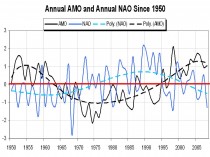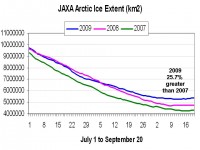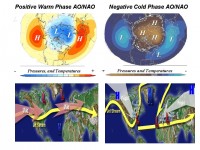By Fred Pearce, New Scientist
Forecasts of climate change are about to go seriously out of kilter. One of the world’s top climate modellers said Thursday we could be about to enter “one or even two decades during which temperatures cool. “People will say this is global warming disappearing,” he told more than 1500 of the world’s top climate scientists gathering in Geneva at the UN’s World Climate Conference.
Latif predicted that in the next few years a natural cooling trend would dominate over warming caused by humans. The cooling would be down to cyclical changes to ocean currents and temperatures in the North Atlantic, a feature known as the North Atlantic Oscillation (NAO). Breaking with climate-change orthodoxy, he said NAO cycles were probably responsible for some of the strong global warming seen in the past three decades. “But how much? The jury is still out,” he told the conference. The NAO is now moving into a colder phase. Latif said NAO cycles also explained the recent recovery of the Sahel region of Africa from the droughts of the 1970s and 1980s. James Murphy, head of climate prediction at the Met Office, agreed and linked the NAO to Indian monsoons, Atlantic hurricanes and sea ice in the Arctic. “The oceans are key to decadal natural variability,” he said.

The NAO is imversely related to the AMO and lags the AMO state as shown above. Enlarged here
Another favourite climate nostrum was upturned when Pope warned that the dramatic Arctic ice loss in recent summers was partly a product of natural cycles rather than global warming. Preliminary reports suggest there has been much less melting this year than in 2007 or 2008.
Here is the latest daily JAXA IJIS based plots for July through September 9 for 2007, 2008, 2009 for arctic ice extent. Note as the melt season draws near an end, we are running 20/8% above the record low levels of 2007, continuing the rebound started in 2008.

In candid mood, climate scientists avoided blaming nature for their faltering predictions, however. “Model biases are also still a serious problem. We have a long way to go to get them right. They are hurting our forecasts,” said Tim Stockdale of the European Centre for Medium-Range Weather Forecasts in Reading, UK.
See full story here.

The positive NAO relates to more zonal flow with warmer Atlantic air into Europe and Pacific air into North America. The negative NAO leads to a more meridional pattern with cold air in Siberia often making its way west to western Europe and Cold arctic air over North America trapped over the eastern and central parts of the continent. Enlarged here
Note: MIT’s Dr. Lindzen commented “Lateef is actually one of the better ocean modelers. However, he used to be all over the German media proclaiming that models were perfect, and should be used to determine policy. When someone responded that since the models were perfect, there was no need for more funding, Lateef developed a deeper appreciation for the model shortcomings. I suppose that there is a lesson here someplace.”
UPDATE: This has led science reporter Eric Berger of the Houston Chronicle to discuss Climate scientists should talk about what “may” happen, rather than what “will” happen
I’m the science reporter for the Houston Chronicle, the daily newspaper in the petrochemical capital of the United States, if not the world. I’ve been called a global warming skeptic by environmentalists, and I’ve been called an environmentalist toady by the skeptics.
I’m neither of these things. Rather, I’m just trying to grasp what is happening to the planet’s climate, and how humans are impacting it.
For a long time now, science reporters have been confidently told the science is settled. That the planet is warming and humans are unquestionably the primary cause. We’ve been told to trust the computer models—the models which show a markedly upward trend in temperatures as carbon dioxide concentrations increase. And I’ve trusted the scientists telling me this.
Below you’ll find the computer model forecasts for the 21st century temperatures from the most recent IPCC summary for policymakers, which call for a 1.8C to 3.8C rise in global temperatures by 2100:
It seems pretty clear that the models forecast a steady upward trend in global temperatures as long as carbon dioxide levels rise. (Which they have). Yet according to satellite and surface temperature measurements the global average temperature has essentially remained flat for the last 12 years. This strikes me as somewhat curious.
When An Inconvenient Truth came out I believed the movie to be scientifically accurate. Carbon dioxide levels were rising and so were temperatures. And hurricane activity, especially after the disastrous 2005 season, was out of control.
But a funny thing happened on the way to the end of the world: hurricane activity on the global scale is near historical lows. And the Earth seems to have, at least temporarily, stopped warming.
This, despite the fact that some of the country’s leading climate scientists say there is unequivocally a link between major hurricanes and climate change. And despite the fact that other leading climate scientists predicted 2009 or 2010 will go down as the warmest year in recorded history. Either prediction, if true, would be alarming.
Yet both of these predictions seem, at the present moment, to be off.
Then there’s this: a revealing story from an international meeting of climate scientists where a German climate scientist says the world may cool for the next decade or two. New Scientist reports:
One of the world’s top climate modelers said Thursday we could be about to enter “one or even two decades during which temperatures cool. “People will say this is global warming disappearing,” he told more than 1500 of the world’s top climate scientists gathering in Geneva at the UN’s World Climate Conference.
“I am not one of the skeptics,” insisted Mojib Latif of the Leibniz Institute of Marine Sciences at Kiel University, Germany. “However, we have to ask the nasty questions ourselves or other people will do it.” Few climate scientists go as far as Latif, an author for the Intergovernmental Panel on Climate Change. But more and more agree that the short-term prognosis for climate change is much less certain than once thought. If we can’t have confidence in the short-term prognosis for climate change, how can we have full confidence in the long-term prognosis?
The article is significant for a couple of reasons. First of all it’s written by Fred Pearce, who has a history of forceful journalism outlining climate change’s perils, and it’s published by New Scientist, which has long advocated vigorous action to curb climate change. I respect both the author and the publication.
Secondly, the key point here is that scientists are acknowledging that natural variations are playing a very important role in our present and future climate, perhaps cooling it. Therefore it stands to reason that natural variations might also have played a role in the temperature run-up of the 20th century. Do not misunderstand me. I am not a climate change skeptic. I do not deny that the planet warmed 0.6C in the 20th century. I do not deny that humans played some part in that significant warming.
But I am confused. Four years ago this all seemed like a fait accompli. Humans were unquestionably warming the climate and changing the planet forever through their emissions of carbon dioxide. The problem is that some climate scientists and environmentalists have been so determined to see something done about carbon dioxide emissions—now—that they have glossed over the uncertainties.
Uncertainties like: maybe there isn’t a linear relationship between carbon dioxide and temperature, and maybe the planet will cool for a couple of decades even as carbon dioxide emissions accelerate. For the last few years some scientists and environmentalists have been telling us a lot about what “will” happen in the future if carbon dioxide emissions continue unabated. It perhaps would have been a lot better if they talked about what “may” happen.
Read more here.
This has led Marc Morano of Climate Depot to comment “I have been researching and reporting on man-made global warming science over the past decade. The past few weeks have—without a doubt—seen the most dramatic acceleration of developments against the claims of a so-called ‘consensus.’ The Houston Chronicle science reporter Eric Berger’s latest admission merely reflects an inescapable reality: Man-made global warming fears are quickly descending into the ash heap of history. Even top UN IPCC scientists are now openly questioning these claims.”




